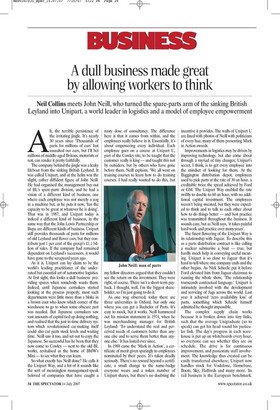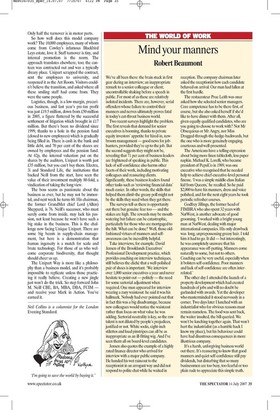A dull business made great by allowing workers to think
Neil Collins meets John Neill, who turned the spare-parts arm of the sinking British Leyland into Unipart, a world leader in logistics and a model of employee empowerment Ah, the terrible persistence of the irritating jingle. It's nearly 30 years since 'Thousands of parts for millions of cars' last assaulted our ears, but I'll bet millions of middle-aged Britons, motorists or not, can render it pretty faithfully.
The company behind the jingle was a leaky lifeboat from the sinking British Leyland. It was called Unipart, and at the helm was the slight, rather diffident figure of John Neill. He had organised the management buy-out of BL's spare-parts division, and he had a vision of a different kind of business, one where each employee was not merely a cog in a machine but, as he puts it now, 'has the capacity to be great at whatever he is doing'. That was in 1987, and Unipart today is indeed a different kind of business, in the same way that the John Lewis Partnership or Bupa are different kinds of business. Unipart still provides thousands of parts for millions of old Leyland and Rover cars, but they contribute just 1 per cent of the group's ill billion of sales. If the company had remained dependent on Leyland's successors, it would have gone to the scrapyard years ago.
As it is, Unipart can lay claim to be the world's leading practitioner of the underrated but essential art of automotive logistics. At first sight, this looks a dull business: providing spares when somebody wants them. Indeed, until Japanese carmakers started looking at the process properly, most such departments were little more than a bloke in a brown coat who knew which corner of the warehouse to go to when some obscure part was needed. But Japanese carmakers saw vast amounts of capital tied up doing nothing, and realised that the just-in-time delivery system which revolutionised car-making itself could also cut parts stock levels and waiting time. Neill saw it too, and set out to copy the Japanese. So successful has he been that they now come to Cowley — next to the old BL works, revitalised as the home of BMW's Mini — to see what they can learn.
So what exactly has Neill done? He calls it the Unipart Way, and a lot of it sounds like the sort of meaningless management-speak beloved of companies that have caught a nasty dose of consultancy. The difference here is that it comes from within, and the employees really believe in it. Essentially, it's about empowering every individual. Each employee goes on a course at Unipart U, part of the Cowley site, to be taught that the customer really is king — and taught this not by outsiders, but by others who have gone before them. Neill explains, 'We all went on training courses to learn how to do training courses. I had really wanted to do this, but my fellow directors argued that they couldn't see the return on the investment. They were right, of course. There isn't a short-term payback. I thought, well, I'm the biggest shareholder, so I'm just going to do it.'
As one wag observed, today there are three universities in Oxford, but only one where you can get a Bachelor of Parts. It's easy to mock, but it works. Neill hammered out his mission statement in 1974, when he was merchandising manager for British Leyland: 'To understand the real and perceived needs of customers better than anyone else and to serve them better than anyone else.' It has lasted ever since.
In 1988 came the 'Mark in Action', a certificate of merit given sparingly to employees nominated by their peers. It's taken deadly seriously. There's no reward beyond a certificate, a small change to the name-badge everyone wears and a token number of Unipart shares, but there's no doubting the incentive it provides. The walls of Unipart U are lined with photos of Neill with politicians of every hue, many of them presenting Mark in Action awards.
Improvements in logistics may be driven by improving technology, but also come about through a myriad of tiny changes; Unipart's secret, I think, is to get every employee into the mindset of looking for them. At the Baggington distribution depot, employees used to pick parts at the rate of 30 an hour, a creditable twice the speed achieved by Ford or GM. The Unipart Way enabled the rate swiftly to double to 60 an hour, with no additional capital investment. The employees weren't being sweated, but they were expected to think and to talk to each other about how to do things better — and best practice was transmitted throughout the business. It sounds easy, but as Neill says, 'it takes painful hard work and practice over many years'.
The finest flowering of the Unipart Way is its relationship with Jaguar. To describe this as a parts distribution contract is like calling a nuclear submarine a boat — true, but hardly much help in conveying useful meaning. Unipart is so close to Jaguar that it's hard to tell where one company ends and the other begins. As Nick Scheele put it before Ford elevated him from Jaguar chairman to running the whole show, 'The relationship transcends contractual language.' Unipart is intimately involved with the development and servicing of Jags across the world. Last year it achieved 'zero availability loss' of parts, something which Scheele himself admitted he thought impossible.
The complex supply chain works because it is broken down into tiny links, such that the average Unigraduate (so to speak) can get his head round his particular link. The day's progress in each warehouse is put up on whiteboards every hour, so everyone can see whether they are on schedule. The drive is for continuous improvement, and passionate staff involvement. The knowledge thus created can be easily transferred elsewhere; Unipart now handles stock for Vodafone, Homebase, Boots, Sky, Halfords and many more. Its rail business is the European benchmark.
Only half the turnover is in motor parts.
So how well does this model company work? The 10,000 employees, many of whom come from Cowley's infamous Blackbird Leys estate, love it. Staff turnover is tiny, and internal promotion is the norm. The approach translates elsewhere, too; the canteen was contracted out and was a typically dreary place. Unipart scrapped the contract, sent the employees to university, and reopened it as the Art Room. Visitors couldn't believe the transition, and asked where all these smiling staff had come from. They were the same people.
Logistics, though, is a low-margin, precarious business, and last year's pre-tax profit was just £19 5 million, down from £50 million in 2005, a figure flattered by the successful settlement of litigation which brought in £17 million. But there's been no dividend since 1999, thanks to a hole in the pension fund (closed to new employees) which is gradually being filled in. There is cash in the bank and little debt, and 70 per cent of the shares are owned by employees and the pension fund. At 42p, the internal valuation put on the shares by the auditors, Unipart is worth just £35 million, but you can't buy them. Electra, 3i and Standard Life, the institutions that backed Neill from the start, have seen the value of their investment multiply 80-fold, a vindication of taking the long view.
The boss seems as passionate about the business as ever, but he may not be immortal, and next week he turns 60. His chairman, the former GrandMet chief Lord (Allen) Sheppard, is 76. Neill's successor, who must surely come from inside, may lack his passion, not least because he won't have such a big stake in the business. This is the challenge now facing Unique Unipart. There are some big beasts in supply-chain management, but here is a demonstration that human ingenuity is a match for scale and brute technology. For those of us who welcome corporate biodiversity, that thought should cheer us up.
The Unipart Way is more like a philosophy than a business model, and it's probably impossible to replicate unless those practicing it really believe. Creating a new jingle just won't do the trick. So step forward John M. Neill CBE, BA, MBA, DBA, FCIM — and receive your Mark in Action. You've earned it.
Neil Collins is a columnist for the London Evening Standard.


















































 Previous page
Previous page